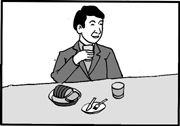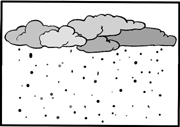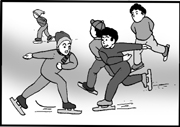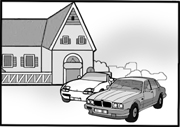第I卷 听力测试(选择题 20分)一、看图听句子,选择与图画内容意思相符和选项。(共4分,每小题1分)




二、听句子,选择恰当的答语。(共6分,每小题1分)
5. A.I‘m not sure.
B.You’re welcome.
C.That‘s right.
6. A.I’m sorry.
B.Hello.
C.See you tomorrow.
7. A.It‘s June 20th.
B.It’s 6:30.
C.It‘sWednesday.
8. A.Hold on for a moment, please.
B.The same to you.
C.Hello! What’s the matter?
9. A.Thank you.
B.Yes, please.
C.That‘s a good idea.
10. A.It doesn’t matter this time.
B.It‘s very kind of you.
C.Nice to meet you!
三、听对话和对话后的问题,然后选择正确答案。(共5分,每小题1分)
11. A.By bike.
B.By bus.
C.On foot.
12. A.He’s cleaning the floor
B.He‘s watching TV.
C.He’s washing his shirt.
13. A.At No.7 Middle School.
B.At No.17 Middle School.
C.At No.70 Middle School.
14. A.Peter‘s mother.
B.Peter’s sister.
C.The girl‘s sister.
15. A.In a factory.
B.In a school.
C.In a shop.
四、听短文和短文后的问题,然后选择正确答案。(共5分,每小题1分)生词:
test 考试 tester 考官
16. A.April 19, 1987.
B.April 9, 1987.
C.April 9, 1978.
17. A.They helped the man a lot.
B.They made the man think of the tester’s face.
C.They made the man feel worse.
18. A.Do you think you can pass if you drive like this?
B.What will a good driver do when he sees a dog in front of his car?
C.If a dog suddenly goes in front of your car, what will you do?
19. A.It was very good.
B.It was not good enough.
C.It was too bad.
20. A.Because he didn‘t think he could pass after he answered the tester’s questions.
B.Because he drove very badly during the test.
C.Because he didn‘t answer any of the tester’s questions.
第 II 卷 笔试(选择题 50分)
五、选择填空(共10分,每小题1分)
从下列各题所给四个选项中选择最佳答案。
21. The twin sisters have learned a lot_____ they came to China.
A.when B.as soon as C.since D.after
22. —This book is a bit difficult._____ read something easier?
—All right.
A.Why not to B.Why don‘t C.Why not D.Why not you
23. —I called you at about half past eight last night, but nobody answered.
—Oh, I _____in my office at that time.
A.will work B.was working C.worked D.had worked
24.—Meimei,_____it again in English, please.
—OK!
A.speak B.talk C.tell D.say
25.—Do you like Jane’s new skirt?
—Yes,very much. I‘ll ask mum to buy _____ for me.
A.one B.it C.the other D.a
26.The boys _____green sports shirts are the fans of Guo’an Team.
A.with B.in C.at D.from
27.This dictionary mustn‘t_____from the library.
A.take away B.taken away C.are taken away D.be taken away
28.—The train is leaving right now, but David hasn’t arrived yet.
—Well, he said he_____here on time.
A.came B.will be C.would come D.can be
29.By the time my parents reached home yesterday, I_____the dinner already.
A.had cooked B.cooked C.have cooked D.cook
30.—Im sorry, Cathy. I _____your radio for such a long time.
—Never mind.
A.have borrowed B.have lent C.have kept D.have returned
六、阅读理解(共30分,每小题2分)
阅读下面A、B、C三篇短文。从短文后每题所给的四个选项中选择最佳答案。
(A)
A lady has a problem with her daughter
My nineyearold daughter, Maria, is in Year Four. Every evening we get into homework battles(争执). Three afternoons a week, she has activities(netball, singing) after school and by the time we get home, homework is the last thing she feels like doing. The other two days, she gets home early and we argue (争论) about whether she should do her home work right after school, or if she should have some time to rest and play first. When Maria at last sits down to do her homework, she seems to want me there helping all the time. I do want to help her, but I‘m sure that she is going to need to be able to do it on her own. And in fact, most of the time, I have other things I need to be doing. It seems that children these days have much more homework than we did, and some of it is really beyond(超越) their abilities(能力). As you can see, I’m really worried about homework and I really dont know what I should do. Any ideas?
31. The woman‘s daughter is _____ .
A.four years old B.six years old C.eight years old D.nine years old
32. Maria doesn’t have any activities after school for_____ afternoons.
A.tow B.three C.five D.seven
33. Maria wants to_____first when she gets home early.
A.do her homework
B.play netball and sing
C.have supper
D.have a rest and play.
34. The woman thinks that her daughter should do her homework_____ .
A.by herself B.with the mother
C.with the faterh D.with the classmates
35. Can you guess where this passage is from?
A.A diary. B.A newspaper.
C.A novel(小说). D.A story.
(B)
For several years, Americans have enjoyed teleshoppingwatching TV and buying things by phone. Now teleshopping is starting in Europe(欧洲). In a number of European countries, people
can turn on their TVs and shop for clothes, jewelry, food, toys, and many other things.
Teleshopping is becoming popular in Sweden, for example. The biggest Swedish company sells different kinds of things on TV in 15 European countries, and in one year it made $100 million. In France there are two teleshopping channels, and the French spend about $20 million a year to buy things through those channels.
In Germany, until last year teleshopping was only possible on one channel for 1 hour every day. Then the government allowed (允许) more telepshopping. Other channels can open for telebusiness, including(包括) the largest American teleshopping company and a 24-hour teleshopping company. German businesses are hoping this new teleshopping will help them sell more things.
Some people like teleshopping because it allows them to do their shopping without leaving their homes. With all the problems of traffic in the cities, this is an important reason. But at the same time, other Europeans do not like this new way of shopping. They call teleshopping “junk(垃圾)on the air”. Many Europeans usually worry about the quality(质量) of the things for sale on TV. Good quality is important to them, and they believe they cannot be sure about the quailty of the things on TV.
The need for high quality means that European teleshopping companies will have to be different from the American companies. They will have to be more careful about the quality of the things they sell. They will also have to work harder to sell things that the buyers cannot touch or see in person.
41. Teleshopping is _____in Europe.
A.not popular B.growing
C.not possible D.cheap
42. People like teleshopping because it is_____.
A.American B.cheaper
C.easier D.more popular
43. Some Europeans don‘t like teleshopping because they _____ .
A.don’t like to buy things
B.don‘t watch TV
C.believe the things sold on TV are expensive
D.think the things sold on TV are bad quality
44. In Germany, teleshopping may_____ .
A.help businessmen get more money
B.keep the shops open longer
C.have fewer buyers
D.bring better TV programmes
45. The best title of this passage is _____ .
A.American Teleshopping
B.Teleshopping Companies
C.Teleshopping in Europe
D.Teleshopping — Junk on the Air
七、完形填空(共10分,每小题1分)
通读下面短文,掌握其大意,然后从短文后各题所给的四个选项中选择有填入相应空白处的最佳答案。
Farley worked for the Canadian government. One day, he was 46_____to learn more about wolves(狼). Do wolves kill lots of caribou(big animals)? Do they kill people?
They gave him lots of food and clothes and guns(枪). Then they put him on a plane and took him to47_____. The plane put him down and went away. There were no houses or people in this place. But there were lots of animals — and lots of wolves.
People tell terrible stories about wolves. They say wolves like to kill and eat people. Farley remembered these stories, and he was48_____.He had his gun with him49_____ .
Then one day, he saw a group of wolves. There was a mother wolf with four baby wolves. A father wolf and another young wolf lived with them.
Farley watched these wolves every day. The mother was a very 50_____mother. She gave milk to her babies. She gave them lessons about life. They learned how to51_____food. The father wolf got food for the mother. The young wolf52_____
the children. They were a nice, happy family—a wolf family! Farley did not need his53_____any more. In a short time, he got on well with the wolf family. Farley watched them for five months. He learned many new things about wolves. He learned that many stories about the wolves were54_____.
Wolves do not eat people, and they do not eat many large animals. and he also learned bad things about men. It was men who killed many caribou and wolves.
Later, Farley wrote a book about wolves. he wanted people to 55_____them and not to kill them.
46.A.seen B.told C.heard D.found
47.A.a small town B.a big cityC.a far place D.a lonely village
48.A.afraid B.happy C.angry D.tired
49.A.at times B.all the time C.once a week D.every afternoon
50.A.bad B.good C.hungry D.thirsty
51.A.cook B.make C.get D.pick
52.A.shouted at B.looked into C.laughed at D.played with
53.A.food B.clothes C.gun D.plane
54.A.not good B.not true C.not easy D.not clear
55.A.grow B.have C.teach D.understand
第 III 卷 笔试(非选择题 50分)
一、根据句意用括号内所给单词的适当形式填空。(共8分,每小题1分)
1. Beijingers are true_____to the world.(friend)
2. Look! How_____ Kitty is laughing!(happy)
3. Its only ten _____walk from the station to the hotel.(minute)
4. Please take care of _____ ,boys and girls.(you)
5. I don’t think this is my frisby, though is looks like _____.(I)
6. Mrs. Green learned Chinese as her_____language.(two)
7. I think July is _____than any other months in our country.(hot)
8. Of all the students in our class, Lucy talks _____but does most.(little)
二、用方框中所给单词或词组的适当形式填空,每个单词或词组只能使用一次。(共10分,每小题1分)
join, not eat, like, give a talk, watch,
throw, return, not rain, decide, how often
9. It_____much this spring in North China, so we are now short of water.
10.— _____do you use the Internet?
— Almost every day.
11. I‘m very glad to hear that Michael Jordan_____to NBA again soon.
12.Zhao Wei and Lu Yi, the popular TV stars,
_____by most of the young people.
13. —What is Yang Lan doing there?
—Oh, she _____on“New Beijing, Great Olympics”.
14. People should stop_____ dirty things into Kun Yu River.
15. You’d better_____sweets before you go to bed.
16. If China_____the WTO, she will become richer and stronger.
17. It‘s 8:20 already. It’s time for us _____The Gate of Reign on TV.
18. Zhang Jian_____already_____to swim
across the English Channel(英吉利海峡).
三、在下列各题B句的每个空格处填入一个单词,使B句的意思与A句相近。(共10分,每小题2分)
19. A.“Don‘t go to work until you feel well,”the doctor said to me.
B. The doctor told me __________go to work until I felt well.
20. A. Ann spent two weeks getting ready for the exams.
B. It_____ann two weeks to_____ready for the exams.
21. A. Every day, Wang Zhizhi receives Emails from thousands of basketball fans.
B. Every day , Wang Zhizhi_____ _____thousands of basketball fans.
22. A. A computer is more useful than a VCD.
B. This car was not _____ _____for Charlie to buy.
23. A. Charlie found this car too expensive to buy.
B. This car was not_____ _____for Charlie to buy.
四、单句改错。下面各题划线部分有一处错误,请指出并改正。(共10分,每小题2分)
24.His uncle knows little about H.O.T., doesn’t he?()
25.—Where are my shoes, Granny?
—It‘s right under your desk. ( )
26.It is wide used and more and more poeple are interseted in it. ( )
27.Would you please let me know when you have match?( )
28.There will have an important meeting of the IOC
(国际奥委会) in Moscow on July 13th.( )
五、根据中文意思和英文提示词语,写出意思连贯,符合逻辑的英文文段。所给英文提示词 语必须都用上,中文提示内容不必逐句翻译,每组英文提示所写出的句数不限。(共12分)
澳大利亚学生 Sam 最近又来到北京,去了王府井,发现这里发生了巨大的变化,请你以 Sam 的身份给父母写一张明信片,介绍……
1.happy, visit, again
2.change, take place
3.go, Wang Fu Jing Street, morning, building, shop, market
4.flower, poster(宣传画), put, for, the Olympics
答案及评分标准
第 I 卷、第 II 卷(共70分)
1.A 2.C 3.B 4.A 5.B 6.C 7.B 8.A 9.C 10.A 11.B 12.C 13.B 14.B 15.C 16.B 17.C 18.C 19.B 20.A 21.C 22.C 23.B 24.D 25.A 26.B 27.D 28.C 29.A 30.C 31.D 32.A 33.D 34.A 35.B 36.D 37.A 38.C 39.B 40.D 41.B 42.C 43.D 44.A 45.C 46.B 47.C 48.A 49.B 50.B 51.C 52.D 53.C 54.B 55.D
第 III 卷(共50分)
阅卷须知:
1.保持卷面整洁,严格按试卷答案阅卷,认真掌握评分标准。
2.一律用红钢笔或红圆珠笔批阅,字迹要求清楚。
3.阅卷人员将各大题得分先填入左边记分栏内,再填入卷首记分栏内,并分别签名。
4.复查人员须在卷首记分栏内签名。
一、本题满分为8分,每小题1分。
1.friends 2.happily 3.minutes4.yourselves 5.mine 6.second 7.hotter 8.(the)least
二、本题满分为10分,每小题1分
9.didnt rain 10.How often 11.will return/is going to return 12.are liked 13.is giving a talk 14.throwing 15.not eat 16.joins 17.to watch 18.has, decided
三、本题满分为10分,每小题2分。
19.not to 20.took, get 21.hearts from 22.so/as, as 23.cheap enough
四、本题满分为10分,每小题2分。
24.(C) does 25.(C) Theyre/They are 26.(A) widely 27.(D) have a match/have matches 28.(A) will be
五、本题满分为12分。
第一档(12—11分)符合题目要求,整篇表达清楚,语言无误。
第二档(10—9分)符合题目要求,整篇表达清楚,语言有少量错误。
第三档(8—7分)基本符合题目要求,整篇表达基本清楚,语言有部分错误。
第四档(6—5分)基本符合题目要求,整篇表达基本清楚,语言有较多错误。
第五档(4—3分)部分内容基本符合题目要求,整篇表达尔完整,但尚能达意,语言有较多错误。
第六档(2—0分)整篇表达不清楚,只照抄或拼凑提示词语。
(注意明信片格式,应有开头的称谓和结尾的落款,如果没有,应扣掉1分。)
参考答案:
Dear Mum and Dad,
I’m very happy to visit Beijing again. Great changes have taken place in Beijing(here). Today I went to Wang Fu Jing Street early in the morning and I had a good time. Noe, there are a lot of new buildings, modern shops and large markets in it (on it/there). Many beautiful flowers and posters are put there (in the street). People in Beijing (here) are woking hard (bidding) for the 2008 Olympics. I hope theyll have good luch.
Yours,
Sam
附:听力测试录音稿
一、看图听句子,选择与图画内容意思相符的选项。
1.A. The boys went skating yesterday.
B. The boys went swimming yesterday.
C. The girls went skating yesterday.
2.A. There is a car in front of the house.
B. There is a bike in front of the house.
C. There are two cars in front of the house.
3.A. My mother is having her breakfast.
B. My father is having his breakfast.
C. My father is washing his face.
4.A. It‘s raining now.
B. It’s a sunny day today.
C. It‘scloudy today.
二、听句子,选择恰当的答语。
5. Thank you very much.
6. See you tomorrow.
7. What’s the time?
8. Hello! Could I speak to Mr Black, please?
9. Shall we meet at the school gate?
10. I‘m sorry. I’m a little late.
三、听对话和对话后的问题,然后选择正确答案。
11.Girl: How do you usually come to school, Jack?
Boy: I usually come to school by bus. Sometimes I come to school on foot.
Question: How does Jack usually come to school?
12.Woman: Hi, Jim! will you go out for a walk with me?
Man: Sorry, I cant go with you. Im washing my shirt.
Question: What is Jim doing?
13.Boy: Where did you study last year, Wei Hua?
Girl: I studied at No.17 Middle School last year.
Question: Where did Wei Hua study last year?
14.Girl: Whats your sisters name, Peter?
Boy: Her name is Betty.
Question: Whos is Betty?
15.Woman: what can I do for you, sir?
Man: I‘m looking for a pair of shoes. Will these shoes wear well?
Woman: Of course. Theyre our best shoes.
Question: Where does the woman work?
四、听短文和短文后的问题,然后选择正确答案。
The most important day in my life was the 9th of April, 1987. That was the day I passed my driving test.
I was very worried and drove very badly on the way to the test centre. My driving teacher said, “If you drive like this druing the test, you will fail. Dont be afraid.” But that just made me more afraid!
The tester was very serious. He didn’t smile once as we got into the car. I drove quite well druing the test and began to feel that I was sure to pass. Then, the tester began asking me questions about driving. He asked me, “What will you do if a dog runs out in front of your car?”I answered, and he sat there, unhappily, for a while and said,“Yes, maybe that is what you will do... but what will a good driver do?” By then, I thought I had failed the test. We drove back to the test centre and as I got out of the car the tester handed me a piece of paper. It had “PASSED” written on it. I was so surprised I started to laugh but the tester still didnt even smile. I was too happy to care.
Now, I have my own car and every Sunday I drive to a friends house or into the centre of the city. I still get a little afraid, though, when I think of my driving test and the teasters face.
Now here are the questions. Please listen carefully.
16. What was the most important day to the man?
17. What do you thing of the driving teachers words?
18. What was the testers first question?
19. What did the tester think of the mans answer to the first queston?
20. Why was the man so surprised when he saw “PASSED” on the paper?